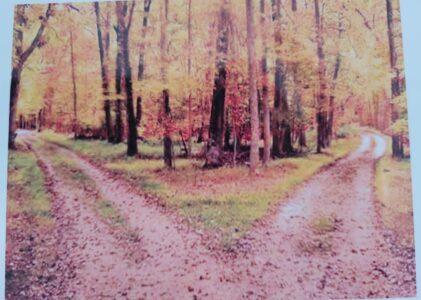I discovered a truth recently. Life is not easy. In fact, often the easy path, the less disciplined way brings us more pain in the long run. What appears easy can hurt more than the actions which are difficult at first. I have felt this firsthand as I let lapse the fitness program to which I had committed to over a decade. My flexibility, strength and balance started to be noticeably impaired. My sleep pattern was getting wonky. My biceps that I had been know for at the gym, started to wither, and wag. I started to believe that perhaps this was what being in the next decade of life brought. I was certainly starting to buy into that thought. SO, that needed changing fast. What was I doing differently now from what I had done when I felt fit, and fabulous? What habit had I adapted, and what habit had I abandoned?
True disclosure, since 2020 when the shutdown down occurred, and re-occurred and yes occurred once more just for security reasons, I shut down. I shut down my social life. I shut down my physical activity at the gym. I did run occasionally outside. I shut down our travel life which was a vital part of my husband’s and my joy of life. I lost dear friends as they passed, from the planet. Some without any ceremony or celebration to mark their lives. My business was forced to shut down by government regulations, with the added fear of penalty if we were to continue serving our clients in person. Thank God, that Purebioenergy Healing Therapy can be done by distance, allowing me to be of service to people, as it was so desperately needed. Many people benefitted from that service, me included.
A new habit of sitting on the couch and watching Trevor Noah and Samantha Bee was created. A habit which has served its purpose and must now be stopped. Heck, even Trevor Noah has moved on to new things. You would think that it would be easy. Just get moving. I know I need to do this. I am willing to be willing to change. Just overcome the inertia. Choose it and do it. I had to choose the harder path, the disciplined path.
Here are three examples of how choosing the tougher path, which often is the path less travelled is better for us. It takes mental discipline. That old blues song “Easy ain’t easy” is true.
Physical activity is essential to our strength, mood, and our flexibility in thought and action.
Upon starting or restarting an exercise program, the movements appear difficult. The first set always hurts the most, the second set the muscles are warming up. By the third set, the mind has stopped resisting the change and accepts that it can do the motion. The muscles fire and the blood courses though the veins, speeding up our breathing, our sweating, and possibly our swearing. Yet in that moment, I feel good. I did it! I now know I can. Thus, I not only increase the muscle fiber, as important if not more so, is that I have created the brain belief that I can do this. I wanted to quit at 6 reps but with encouragement from my trainer I did the full 10. When we have someone to encourage us as we struggle with the difficult bits, we can overcome our desire to quit.
The next part is the repeat. Marcus Aurelius tells us, the mind is honed like steel through repetition and practice. One push up a month will not create a strong physic. But 10 a week, then 100 a week, then 10 push ups a day for a year will change our physical and our mental outlook. A strong body does create a strong mind. Why do people age into frailty? Is it because they stop doing the activity to the degree of discipline they had as a young person? Is it because they are told they are old? If we didn’t know what age we were, how would we act? In Bali where they have the highest number of elderly fit people in the world, people work, live and are active members of society until they die. There is a dance teacher who is 83 years old. She says the smiles of the younger students fill her with joy, and she likes dancing for and with them. Asked if she will retire, she replies Why? She has danced almost every day of her life since she was 4. This is a common practice in Bali. Do the difficult thing until it becomes easy to do, then keep doing it. Celebrate and do it again.
Repetition. Any new skills, be it computer skills, learning a new language, a music or art hobby requires repetition and practice. If you want to change how you think, and how you act, there must be an element of repetition.
When you are making a change to improve your life, you must act. My mentor often says to me, stop thinking, just do. We can get stuck in the thinking. We can become like stagnant pond water. Thinking the same thoughts over and over, reaffirms those thoughts even when the thoughts are detrimental to our wellbeing.
Action creates the opportunity to bring in oxygen. Oxygen brings life to the pond, and life to us. Sitting on the couch for extended periods of time harms us, physically, mentally, and socially. I would add spiritually as well because we are designed to be with other humans. I can attest to the damage it created, as even my confidence had eroded.
The first action can and probably will be difficult. Do it despite the difficulty. Choose to be courageous. A stagnant mind wants to remain stagnant. The belief is that staying the same is easier. Easier, but at what cost? The long-term pain offsets the short-term gain. This is truth in so many aspects of our life.
A delayed tax filing creates financial pain in terms of fees, penalties, and interest charges.
A delayed commitment to eating healthy, pure natural food harms the body. The intestines, the metabolic rate, our mental outlook, emotional wellbeing are all connected. “Let your food be your medicine and your medicine be your food.” This Hippocrates statement can be applied to many levels of well being.
When we eat fast, as opposed to eating fresh, we are losing the opportunity to heal, nourish, and replenish our cells, resulting in the long-term increase of the waistline and the glymphatic waste line, and an increase in blood pressure. The wallet can suffer too. Planning and executing a meal program is a discipline that rewards us in so many ways. Your creativity, sense of accomplishment, energy level and enthusiasm are some of the rewards from that one decision.
It takes a brave man to admit he was wrong. The longer it takes to admit our responsibility in relational disputes, to apologize, and to find a peaceful co-existence, the deeper the damage to both self, and the other. It is the tougher path to humble ourselves and ask for forgiveness. Yet, in doing so, we free ourselves, and the other person, and all the other collateral relationships. Holding on to hurt, and not forgiving also damages us on a cellular level.
Building friendships is a commitment of time, attention and communication. An active social life with meaningful social connections is promoted as one of the secrets to aging well. Having a group of people who get you, and with whom you can be your authentic self builds your confidence. Your attention to your friends’ needs, conversations, and shared experiences builds their self-worth. Love your neighbour as yourself and you both win. This too is a disciplined behavior. It takes effort. It is easier to turn on the TV and zone out, especially in the winter. Invite your friends over, have a healthy meal and hearty laugh.
An unexamined life is not worth living, but a good life, is to be chiefly valued. This quote by Socrates behooves us to pause, reflect and correct the habits, thoughts, and actions that would lead to pain for others and ourselves.
As I soak in some Epsom salts to relieve the DOMS, Delayed Onset Muscle Soreness, I am grateful to Heidi for the workouts which will re-establish my muscle mass.
I am grateful to Rose for pushing me to not procrastinate on publishing this article. I am grateful for my husband who is making me a healthy meal, and doing the dishes so that we wake up to a clean kitchen each morning.
I will write my journal. I will remember the poem: “Two roads diverged in a yellow wood, and I – I took the one less traveled by, and that has made all the difference.”
Ruth Bader Ginsburg says, “Real change, enduring change, happens one step at a time.”
Take that step, especially if it is hard, and repeat it. One foot in front of the other. Your path awaits.
One of my favorite poems is by Robert Frost, The Road Not Taken
The Road Not Taken
Two roads diverged in a yellow wood,
And sorry I could not travel both
And be one traveler, long I stood
And looked down one as far as I could
To where it bent in the undergrowth.
The took the other, just as fair,
And having perhaps the better claim,
Because it was grassy and wanted wear;
Though, as for that, the passing there
Had worn them really about the same.
And both that morning equally lay
In leaves no step had trodden black.
Oh, I kept the first for another day!
Yet knowing how way leads on to way.
I doubted if I should ever come back.
I shall be telling this with a sigh,
Somewhere ages and ages hence:
Two roads diverged in wood, and I –
I took the one less travelled by,
And that has made all the difference.


